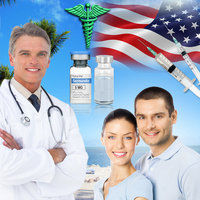Introduction
Late-onset hypogonadism (LOH), also known as age-related low testosterone, is a clinical and biochemical syndrome associated with advancing age in men. Characterized by a decline in testosterone levels, LOH can lead to symptoms such as decreased libido, erectile dysfunction, fatigue, and mood disturbances. Recent research has begun to explore the potential role of nutrition in mitigating the risks and symptoms of LOH. This article reviews the current understanding of dietary supplements and their efficacy in preventing and managing LOH in American men.
Understanding Late-onset Hypogonadism
Late-onset hypogonadism is increasingly recognized as a significant health concern among aging American males. It is estimated that up to 38.7% of men over the age of 45 may experience symptoms of LOH. The condition is not only a matter of reduced testosterone but also involves a complex interplay of hormonal, genetic, and lifestyle factors. As such, a multifaceted approach to prevention and management is essential.
The Role of Nutrition in Hormonal Health
Nutrition plays a pivotal role in overall health and hormonal balance. Certain nutrients and dietary components have been identified as potentially beneficial in supporting testosterone levels and overall male vitality. Key nutrients include vitamins D and K, zinc, magnesium, and omega-3 fatty acids. These nutrients are involved in various physiological processes, including testosterone synthesis and regulation.
Dietary Supplements and Their Efficacy
Several dietary supplements have been studied for their potential to support testosterone levels and alleviate symptoms of LOH. Here, we review some of the most promising supplements:
- **Vitamin D**: Known for its role in bone health, vitamin D also influences testosterone production. Studies have shown a correlation between vitamin D deficiency and low testosterone levels. Supplementation may help improve testosterone levels, particularly in men with existing deficiencies.
- **Zinc**: Essential for numerous enzymatic reactions, zinc is crucial for testosterone production. Zinc supplementation has been shown to increase serum testosterone levels in zinc-deficient men, suggesting a potential role in managing LOH.
- **Magnesium**: This mineral is involved in over 300 biochemical reactions in the body, including those related to testosterone synthesis. Magnesium supplementation has been associated with increased free testosterone levels in athletes and may have similar benefits for men with LOH.
- **Omega-3 Fatty Acids**: Found in fish oil, omega-3 fatty acids have anti-inflammatory properties and may support cardiovascular health. Some studies suggest that omega-3 supplementation can improve testosterone levels, although more research is needed to confirm these findings.
- **D-Aspartic Acid (D-AA)**: An amino acid that has been shown to increase testosterone levels in some studies. D-AA may stimulate the release of luteinizing hormone, which in turn boosts testosterone production. However, the long-term effects and optimal dosing require further investigation.
Challenges and Considerations
While dietary supplements show promise in supporting testosterone levels and managing LOH, several challenges and considerations must be addressed. The quality and purity of supplements can vary widely, and not all products on the market are backed by rigorous scientific research. Additionally, individual responses to supplements can differ, and what works for one man may not be effective for another.
It is also important to consider the potential interactions between supplements and medications. Men with LOH should consult with healthcare providers before starting any new supplement regimen, especially if they are taking medications for other conditions.
Conclusion
Nutrition and dietary supplements offer a promising avenue for preventing and managing late-onset hypogonadism in American men. By focusing on key nutrients and understanding the potential benefits of specific supplements, men can take proactive steps to support their hormonal health and overall vitality. However, it is crucial to approach supplementation with caution and under the guidance of healthcare professionals to ensure safety and efficacy. As research continues to evolve, the role of nutrition in male health will likely become even more significant, offering new strategies for maintaining optimal testosterone levels and quality of life in aging men.
Contact Us For A Fast And Professional Response

- Exploring Alternative Therapies for Late-Onset Hypogonadism in American Males [Last Updated On: February 20th, 2025] [Originally Added On: February 20th, 2025]
- Economic Impact of Late-Onset Hypogonadism on American Men's Healthcare [Last Updated On: March 16th, 2025] [Originally Added On: March 16th, 2025]
- Nutrition's Role in Managing Late-Onset Hypogonadism in American Males [Last Updated On: March 17th, 2025] [Originally Added On: March 17th, 2025]
- Managing Late-Onset Hypogonadism: Symptoms, Diagnosis, and Treatment for American Men [Last Updated On: March 18th, 2025] [Originally Added On: March 18th, 2025]
- Late-Onset Hypogonadism: Symptoms, Diagnosis, and Treatment in American Males [Last Updated On: March 19th, 2025] [Originally Added On: March 19th, 2025]
- Genetic Predisposition and Ethnic Impact on Late-Onset Hypogonadism in American Males [Last Updated On: March 19th, 2025] [Originally Added On: March 19th, 2025]
- Late-Onset Hypogonadism: Effects on Male Fertility and Management Strategies [Last Updated On: March 20th, 2025] [Originally Added On: March 20th, 2025]
- Understanding Late-Onset Hypogonadism: Symptoms, Detection, and Management in American Males [Last Updated On: March 20th, 2025] [Originally Added On: March 20th, 2025]
- Late-Onset Hypogonadism: Impact on Muscle Mass in American Men and Management Strategies [Last Updated On: March 20th, 2025] [Originally Added On: March 20th, 2025]
- Managing Late-Onset Hypogonadism: Detection, Lifestyle, and Hormone Therapy in American Men [Last Updated On: March 20th, 2025] [Originally Added On: March 20th, 2025]
- Late-Onset Hypogonadism: Effects on Mood, Energy, and Quality of Life in American Men [Last Updated On: March 20th, 2025] [Originally Added On: March 20th, 2025]
- Advancements in Late-Onset Hypogonadism Treatment: Emerging Therapies and Personalized Medicine [Last Updated On: March 21st, 2025] [Originally Added On: March 21st, 2025]
- Late-Onset Hypogonadism: Symptoms, Diagnosis, and Management Strategies for American Men [Last Updated On: March 21st, 2025] [Originally Added On: March 21st, 2025]
- Exercise Strategies to Combat Late-Onset Hypogonadism in Aging American Males [Last Updated On: March 21st, 2025] [Originally Added On: March 21st, 2025]
- Late-Onset Hypogonadism: Symptoms, Long-Term Effects, and Management in American Men [Last Updated On: March 23rd, 2025] [Originally Added On: March 23rd, 2025]
- Hormone Replacement Therapy for Late-Onset Hypogonadism: Benefits, Risks, and Future Directions [Last Updated On: March 23rd, 2025] [Originally Added On: March 23rd, 2025]
- Exploring the Link Between Late-Onset Hypogonadism and Diabetes in American Males [Last Updated On: March 23rd, 2025] [Originally Added On: March 23rd, 2025]
- Late-Onset Hypogonadism: Understanding TRT, Side Effects, and Alternative Treatments [Last Updated On: March 23rd, 2025] [Originally Added On: March 23rd, 2025]
- Late-Onset Hypogonadism: Symptoms, Monitoring, and Management in American Males [Last Updated On: March 24th, 2025] [Originally Added On: March 24th, 2025]
- Late-Onset Hypogonadism: Impacts on American Men's Relationships and Treatment Options [Last Updated On: March 24th, 2025] [Originally Added On: March 24th, 2025]
- Late-Onset Hypogonadism: Impacts on Cognitive Function and Management Strategies [Last Updated On: March 24th, 2025] [Originally Added On: March 24th, 2025]
- Early Intervention Benefits for Late-Onset Hypogonadism in American Men [Last Updated On: March 24th, 2025] [Originally Added On: March 24th, 2025]
- Late-Onset Hypogonadism in American Males: Symptoms, Diagnosis, and Management Strategies [Last Updated On: March 25th, 2025] [Originally Added On: March 25th, 2025]
- Managing Late-Onset Hypogonadism: Holistic Approaches and Treatment Strategies [Last Updated On: March 25th, 2025] [Originally Added On: March 25th, 2025]
- Understanding Late-Onset Hypogonadism: Diagnosis and Management for American Males [Last Updated On: March 25th, 2025] [Originally Added On: March 25th, 2025]
- Late-Onset Hypogonadism in American Men: Symptoms, Diagnosis, and Management Strategies [Last Updated On: March 25th, 2025] [Originally Added On: March 25th, 2025]
- Late-Onset Hypogonadism in American Men: Symptoms, Diagnosis, and Management Strategies [Last Updated On: March 25th, 2025] [Originally Added On: March 25th, 2025]
- Managing Late-Onset Hypogonadism: Diet and Nutrition Strategies for American Men [Last Updated On: March 25th, 2025] [Originally Added On: March 25th, 2025]
- Late-Onset Hypogonadism: Understanding, Stigma, and Treatment in American Males [Last Updated On: March 25th, 2025] [Originally Added On: March 25th, 2025]
- Late-Onset Hypogonadism: Impact on Sexual Health and Management Strategies for American Men [Last Updated On: March 25th, 2025] [Originally Added On: March 25th, 2025]
- Emotional Journey of American Men with Late-Onset Hypogonadism: Challenges and Support [Last Updated On: March 25th, 2025] [Originally Added On: March 25th, 2025]
- Late-Onset Hypogonadism: Impact on Sleep and Management Strategies for American Men [Last Updated On: March 25th, 2025] [Originally Added On: March 25th, 2025]
- Managing Late-Onset Hypogonadism: Symptoms, Diagnosis, and Treatment in Aging Men [Last Updated On: March 26th, 2025] [Originally Added On: March 26th, 2025]
- Late-Onset Hypogonadism in Aging American Males: Symptoms, Diagnosis, and Multidisciplinary Management [Last Updated On: March 26th, 2025] [Originally Added On: March 26th, 2025]
- Dispelling Myths: Understanding and Managing Late-Onset Hypogonadism in American Men [Last Updated On: March 26th, 2025] [Originally Added On: March 26th, 2025]
- Understanding and Managing Late-Onset Hypogonadism in American Men: Symptoms, Diagnosis, and Treatment [Last Updated On: March 26th, 2025] [Originally Added On: March 26th, 2025]
- Community Support Enhances Life Quality for Men with Late-Onset Hypogonadism [Last Updated On: March 26th, 2025] [Originally Added On: March 26th, 2025]
- Untreated Late-Onset Hypogonadism: Health Risks and Importance of Early Intervention in US Men [Last Updated On: March 27th, 2025] [Originally Added On: March 27th, 2025]
- Financial Burden of Late-Onset Hypogonadism in American Men: Costs and Management [Last Updated On: March 27th, 2025] [Originally Added On: March 27th, 2025]
- Advanced Technologies Revolutionizing Late-Onset Hypogonadism Diagnosis in American Males [Last Updated On: March 27th, 2025] [Originally Added On: March 27th, 2025]
- Understanding Late-Onset Hypogonadism: Diagnosis and Management for American Men [Last Updated On: March 27th, 2025] [Originally Added On: March 27th, 2025]
- Cultural Perceptions and Management of Late-Onset Hypogonadism in American Men [Last Updated On: March 27th, 2025] [Originally Added On: March 27th, 2025]
- Understanding and Managing Late-Onset Hypogonadism in American Men: Symptoms, Diagnosis, and Treatment [Last Updated On: March 27th, 2025] [Originally Added On: March 27th, 2025]
- Late-Onset Hypogonadism: Impacts on American Men's Careers and Cognitive Function [Last Updated On: March 28th, 2025] [Originally Added On: March 28th, 2025]
- Managing Late-Onset Hypogonadism: Preserving Independence in American Men [Last Updated On: March 28th, 2025] [Originally Added On: March 28th, 2025]
- Advocating for Better Late-Onset Hypogonadism Care: A Guide for American Men [Last Updated On: March 28th, 2025] [Originally Added On: March 28th, 2025]
- Stress Exacerbates Late-Onset Hypogonadism in American Males: A Holistic Approach [Last Updated On: March 28th, 2025] [Originally Added On: March 28th, 2025]
- Legal Rights and Workplace Accommodations for American Men with Late-Onset Hypogonadism [Last Updated On: March 28th, 2025] [Originally Added On: March 28th, 2025]
- Managing Late-Onset Hypogonadism: Symptoms, Diagnosis, and Treatment for American Men [Last Updated On: March 28th, 2025] [Originally Added On: March 28th, 2025]
- Late-Onset Hypogonadism: Diagnosis, Treatment, and Management Strategies for American Men [Last Updated On: March 29th, 2025] [Originally Added On: March 29th, 2025]
- Holistic Management of Late-Onset Hypogonadism: Integrating Mental Health Support [Last Updated On: March 30th, 2025] [Originally Added On: March 30th, 2025]
- Late-Onset Hypogonadism: Family Support and Management Strategies for American Males [Last Updated On: March 30th, 2025] [Originally Added On: March 30th, 2025]
- Navigating Insurance Coverage for Late-Onset Hypogonadism in American Men [Last Updated On: April 1st, 2025] [Originally Added On: April 1st, 2025]
- Managing Late-Onset Hypogonadism: Lifestyle Strategies for American Men [Last Updated On: April 2nd, 2025] [Originally Added On: April 2nd, 2025]
- Late-Onset Hypogonadism: Peer Support's Role in Enhancing Men's Health and Well-being [Last Updated On: April 5th, 2025] [Originally Added On: April 5th, 2025]
- Late-Onset Hypogonadism in American Males: Symptoms, Treatment, and Lifestyle Management [Last Updated On: April 5th, 2025] [Originally Added On: April 5th, 2025]
- Late-Onset Hypogonadism: Impact on Self-Esteem and Treatment Options for American Men [Last Updated On: April 5th, 2025] [Originally Added On: April 5th, 2025]
- Managing Late-Onset Hypogonadism: Stress Reduction Strategies for American Men [Last Updated On: April 6th, 2025] [Originally Added On: April 6th, 2025]
- Late-Onset Hypogonadism: Social Impacts and Management Strategies for American Men [Last Updated On: April 7th, 2025] [Originally Added On: April 7th, 2025]
- Late-Onset Hypogonadism in American Men: Advocacy and Management Strategies [Last Updated On: April 8th, 2025] [Originally Added On: April 8th, 2025]
- Research Advances in Late-Onset Hypogonadism: Diagnosis, Treatment, and Safety in the US [Last Updated On: April 9th, 2025] [Originally Added On: April 9th, 2025]
- Nutritionists' Role in Managing Late-Onset Hypogonadism Through Diet and Key Nutrients [Last Updated On: April 9th, 2025] [Originally Added On: April 9th, 2025]
- Managing Late-Onset Hypogonadism: Symptoms, Screening, and Treatment for American Men [Last Updated On: April 9th, 2025] [Originally Added On: April 9th, 2025]
- Late-Onset Hypogonadism: Symptoms, Diagnosis, and Treatment in American Males [Last Updated On: April 10th, 2025] [Originally Added On: April 10th, 2025]
- Exercise as a Key Strategy for Managing Late-Onset Hypogonadism in American Men [Last Updated On: April 10th, 2025] [Originally Added On: April 10th, 2025]
- Managing Late-Onset Hypogonadism: Strategies for American Men's Mental Health [Last Updated On: April 11th, 2025] [Originally Added On: April 11th, 2025]
- Late-Onset Hypogonadism: Emotional Impacts and Management Strategies for American Men [Last Updated On: April 13th, 2025] [Originally Added On: April 13th, 2025]
- Endocrinologists' Vital Role in Managing Late-Onset Hypogonadism in American Men [Last Updated On: April 14th, 2025] [Originally Added On: April 14th, 2025]
- Managing Late-Onset Hypogonadism: A Guide for American Men's Healthcare Navigation [Last Updated On: April 14th, 2025] [Originally Added On: April 14th, 2025]
- Late-Onset Hypogonadism: Understanding, Diagnosing, and Treating Age-Related Testosterone Decline [Last Updated On: April 15th, 2025] [Originally Added On: April 15th, 2025]
- Understanding and Managing Late-Onset Hypogonadism in Aging American Men [Last Updated On: April 16th, 2025] [Originally Added On: April 16th, 2025]
- Late-Onset Hypogonadism: Symptoms, Diagnosis, and Comprehensive Management Strategies [Last Updated On: April 17th, 2025] [Originally Added On: April 17th, 2025]
- Navigating Late-Onset Hypogonadism: Community Resources and Support for American Men [Last Updated On: April 17th, 2025] [Originally Added On: April 17th, 2025]
- Therapists' Crucial Role in Managing Late-Onset Hypogonadism in American Males [Last Updated On: April 18th, 2025] [Originally Added On: April 18th, 2025]
- Holistic Management of Late-Onset Hypogonadism in American Men: Diet, Exercise, and More [Last Updated On: April 18th, 2025] [Originally Added On: April 18th, 2025]
- Managing Late-Onset Hypogonadism: Symptoms, Diagnosis, and Treatment Options for American Men [Last Updated On: April 19th, 2025] [Originally Added On: April 19th, 2025]
- Late-Onset Hypogonadism: Impact on American Men's Professional Performance and Management Strategies [Last Updated On: April 19th, 2025] [Originally Added On: April 19th, 2025]
- Managing Late-Onset Hypogonadism: Lifestyle Strategies for American Men's Health [Last Updated On: April 20th, 2025] [Originally Added On: April 20th, 2025]
- Understanding Late-Onset Hypogonadism: Symptoms, Diagnosis, and Management in Aging Men [Last Updated On: April 20th, 2025] [Originally Added On: April 20th, 2025]
- Understanding Late-Onset Hypogonadism: Symptoms, Causes, and Treatment in Aging Men [Last Updated On: April 21st, 2025] [Originally Added On: April 21st, 2025]
















